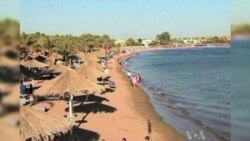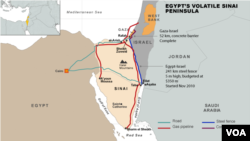CAIRO —
Egypt's Sinai peninsula has grown increasingly lawless since the revolution, with officials bringing new accusations the region is home to terrorist training camps.
Egypt's Sinai Peninsula has long been a country apart. It has its share of foreign tourists seeking sun and sand on the Red Sea. But for residents, life is hard.
The Bedouin have long felt disenfranchised and excluded from the tourist wealth in southern Sinai. Now, in northern Sinai, jihadists, smugglers and common criminals are finding that post-revolution lawlessness makes the desolate landscape a perfect hiding place.
The region is awash with arms, smuggled from Libya and Sudan and with some - but not all - passing through tunnels to Gaza.
Sameh Seif el Yazal is a retired general and security expert.
"Some of it goes there, maybe to Syria after that, I don't know. But some of it is still in Egypt, used by whom, this is the question, and used when, that's another question," said el Yazal.
Egyptian authorities say they recently disrupted a terror cell that received part of its training in northern Sinai camps, in preparation for attacks on domestic and foreign interests in Egypt.
Yet enforcing security in Sinai is difficult because troop movements are limited by international agreement. Professor Christian Donath of American University in Cairo.
"They have to bring sort of military assets into the Sinai, and this is a real problem from the standpoint of the treaty with Israel," said Donath.
Even if authorities could act, some believe the current government has yet to take a stand that would hurt fellow Islamists in Gaza. El Yazal says efforts to close the tunnels are a case in point.
"They damaged it very nicely and softly - in the sense that a couple of days after it was working again," he said.
Yet some Islamists say they are trying to be part of the solution, pointing to their efforts to temper jihadi and other extremist views in Sinai.
Safwat Abdel Ghani is with Gama'a al-Islamiya. The group renounced terror in the 1990s.
"If it had not been our role and that of other Islamic movements that belong to the Salafis and the Brotherhood, such thoughts would have spread widely," said Ghani.
But Abdel Ghani argues that “reasoning” with extremists is not enough to bring peace.
Egypt's government must commit to greater political engagement as well as economic development to bring the people of northern Sinai back into the fold, he says. With resources countrywide stretched thin, Sinai is likely to remain beyond reach.
Egypt's Sinai Peninsula has long been a country apart. It has its share of foreign tourists seeking sun and sand on the Red Sea. But for residents, life is hard.
The Bedouin have long felt disenfranchised and excluded from the tourist wealth in southern Sinai. Now, in northern Sinai, jihadists, smugglers and common criminals are finding that post-revolution lawlessness makes the desolate landscape a perfect hiding place.
The region is awash with arms, smuggled from Libya and Sudan and with some - but not all - passing through tunnels to Gaza.
Sameh Seif el Yazal is a retired general and security expert.
"Some of it goes there, maybe to Syria after that, I don't know. But some of it is still in Egypt, used by whom, this is the question, and used when, that's another question," said el Yazal.
Egyptian authorities say they recently disrupted a terror cell that received part of its training in northern Sinai camps, in preparation for attacks on domestic and foreign interests in Egypt.
Yet enforcing security in Sinai is difficult because troop movements are limited by international agreement. Professor Christian Donath of American University in Cairo.
"They have to bring sort of military assets into the Sinai, and this is a real problem from the standpoint of the treaty with Israel," said Donath.
Even if authorities could act, some believe the current government has yet to take a stand that would hurt fellow Islamists in Gaza. El Yazal says efforts to close the tunnels are a case in point.
"They damaged it very nicely and softly - in the sense that a couple of days after it was working again," he said.
Yet some Islamists say they are trying to be part of the solution, pointing to their efforts to temper jihadi and other extremist views in Sinai.
Safwat Abdel Ghani is with Gama'a al-Islamiya. The group renounced terror in the 1990s.
"If it had not been our role and that of other Islamic movements that belong to the Salafis and the Brotherhood, such thoughts would have spread widely," said Ghani.
But Abdel Ghani argues that “reasoning” with extremists is not enough to bring peace.
Egypt's government must commit to greater political engagement as well as economic development to bring the people of northern Sinai back into the fold, he says. With resources countrywide stretched thin, Sinai is likely to remain beyond reach.






